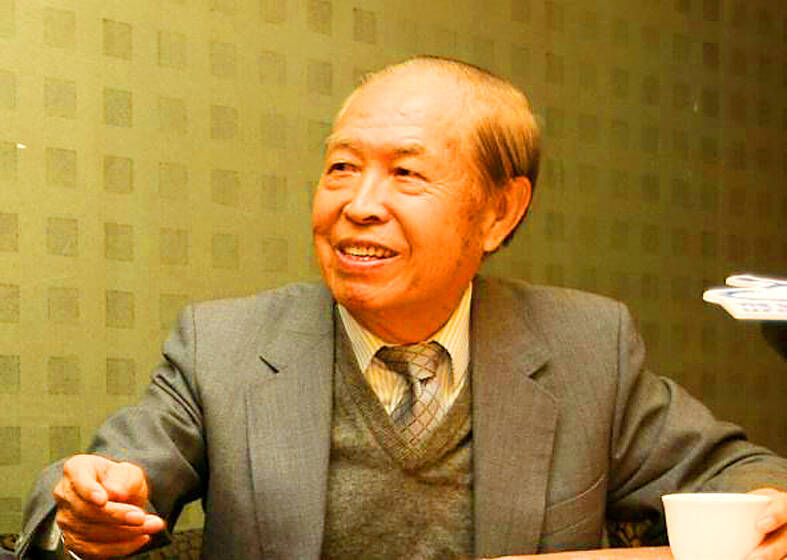Luo Kuang-rui (羅光瑞), a former superintendent of Taipei Veterans General Hospital and pioneer of efforts to introduce universal hepatitis B vaccines for newborns in Taiwan, has died at the age of 101.
Taipei Veterans General Hospital confirmed that Luo died from multiple organ failure at the hospital on Friday last week, surrounded by family.
Luo and his team at the hospital had been among the first to promote the hepatitis B vaccine for newborns in the 1980s, Academia Sinica academic and hepatologist Chen Pei-jer (陳培哲) said on Sunday.

Photo: CNA
Despite limited research on the topic at the time, Luo advocated administering the first dose of the vaccine within 24 hours of delivery, as hepatitis is frequently passed from mother to child at birth, Chen said.
In 1984, Taiwan became one of the first countries in the world to launch a nationwide vaccination program, which led to a dramatic reduction in cases of the virus over the next 10 years, Chen said.
Prior to 1984, 70 to 80 percent of Taiwanese had been infected by hepatitis B and 15 to 20 percent were permanent chronic carriers, which made complications of viral hepatitis such as cirrhosis and liver cancer the nation’s leading causes of death, the Ministry of Science and Technology said in a report.
In subsequent years — including during his time as the hospital’s superintendent from 1988 to 1994 — Luo continued his clinical research on hepatitis B vaccination for newborns, to prove that it was safe and effective, Chen said.
Chen said that although he only met him in person after Luo had retired, he remained engaged and intellectually curious, returning to the hospital to attend medical lectures every week.
Only after a fall in his 90s did he begin to withdraw from public life, he said.
Luo, whose areas of expertise included gastroenterology, hepatitis prevention and vaccines, was a graduate of National Defense Medical Center and did postdoctoral research at the University of Washington.
Luo was also the founding superintendent of Taichung Veterans General Hospital and head of the Department of Internal Medicine at National Defense Medical Center.

The brilliant blue waters, thick foliage and bucolic atmosphere on this seemingly idyllic archipelago deep in the Pacific Ocean belie the key role it now plays in a titanic geopolitical struggle. Palau is again on the front line as China, and the US and its allies prepare their forces in an intensifying contest for control over the Asia-Pacific region. The democratic nation of just 17,000 people hosts US-controlled airstrips and soon-to-be-completed radar installations that the US military describes as “critical” to monitoring vast swathes of water and airspace. It is also a key piece of the second island chain, a string of

A magnitude 5.9 earthquake that struck about 33km off the coast of Hualien City was the "main shock" in a series of quakes in the area, with aftershocks expected over the next three days, the Central Weather Administration (CWA) said yesterday. Prior to the magnitude 5.9 quake shaking most of Taiwan at 6:53pm yesterday, six other earthquakes stronger than a magnitude of 4, starting with a magnitude 5.5 quake at 6:09pm, occurred in the area. CWA Seismological Center Director Wu Chien-fu (吳健富) confirmed that the quakes were all part of the same series and that the magnitude 5.5 temblor was

Taiwan will now have four additional national holidays after the Legislative Yuan passed an amendment today, which also made Labor Day a national holiday for all sectors. The Chinese Nationalist Party (KMT) and Taiwan People’s Party (TPP) used their majority in the Legislative Yuan to pass the amendment to the Act on Implementing Memorial Days and State Holidays (紀念日及節日實施辦法), which the parties jointly proposed, in its third and final reading today. The legislature passed the bill to amend the act, which is currently enforced administratively, raising it to the legal level. The new legislation recognizes Confucius’ birthday on Sept. 28, the

The Central Weather Administration has issued a heat alert for southeastern Taiwan, warning of temperatures as high as 36°C today, while alerting some coastal areas of strong winds later in the day. Kaohsiung’s Neimen District (內門) and Pingtung County’s Neipu Township (內埔) are under an orange heat alert, which warns of temperatures as high as 36°C for three consecutive days, the CWA said, citing southwest winds. The heat would also extend to Tainan’s Nansi (楠西) and Yujing (玉井) districts, as well as Pingtung’s Gaoshu (高樹), Yanpu (鹽埔) and Majia (瑪家) townships, it said, forecasting highs of up to 36°C in those areas